Embarking on Adventure: Essential Camping in USA Tips for Beginners
Hello adventure seekers! If you’re itching to break free from the routine, breathe in the crisp, untamed air, and immerse yourself in the great outdoors, you’ve stumbled upon the perfect guide. I’m thrilled to take you on a journey into the heart of camping in the USA, offering a trove of tips tailored just for beginners.
Camping isn’t just a pastime; it’s an experience that connects you with nature in ways you never thought possible. Picture sitting by a crackling campfire, surrounded by towering trees and under a sky filled with stars – that’s the magic we’re aiming for. But, of course, the path to that idyllic scene involves some preparation, planning, and a touch of know-how.
In this guide, we’ll delve into the essentials, ensuring your first camping trip is not just memorable but also a stepping stone to a lifetime of outdoor adventures. So, lace up those hiking boots, grab your backpack, and let’s embark on a journey that will leave you with stories to tell and memories to cherish. Welcome to the world of camping in the USA – tailor-made for beginners like you!
Choosing the Right Location:
Now that you’ve caught the camping bug, let’s talk about the crucial first step – finding the perfect spot to pitch your tent. The United States is a vast playground for outdoor enthusiasts, offering a diverse range of landscapes, climates, and camping experiences. Here’s how to choose the right location for your inaugural camping adventure.
- Research, Research, Research: Dive into the endless sea of online resources to find camping sites that align with your preferences. Look for recommendations from seasoned campers, explore forums, and check out camping websites to discover hidden gems and popular destinations.
- Consider Your Comfort Zone: As a beginner, it’s wise to start with campsites that cater to novices. Opt for locations with easily accessible amenities, well-marked trails, and straightforward setups. This will allow you to ease into the camping lifestyle without feeling overwhelmed.
- Climate and Seasonal Factors: Mother Nature has her moods, so consider the climate and season when selecting a camping spot. Research the average temperatures, precipitation, and any extreme weather conditions that might catch you off guard. This ensures you’re adequately prepared for whatever weather comes your way.
- Terrain Matters: Different terrains offer varying challenges and experiences. Whether you prefer the tranquility of a lakeside retreat, the ruggedness of mountainous landscapes, or the simplicity of a forested campground, choose a terrain that aligns with your comfort level and desired activities.
- Regulations and Permits: Before you start packing, familiarize yourself with the specific regulations and permit requirements of your chosen campsite. Some locations may have restrictions on campfires, trail usage, or the number of campers allowed. Ensuring compliance not only keeps you on the right side of the law but also promotes responsible outdoor ethics.
By putting in the effort to choose the right location, you’re setting the stage for a camping experience that aligns with your preferences and comfort level. So, get ready to embark on an adventure that suits your style – the great outdoors awaits!
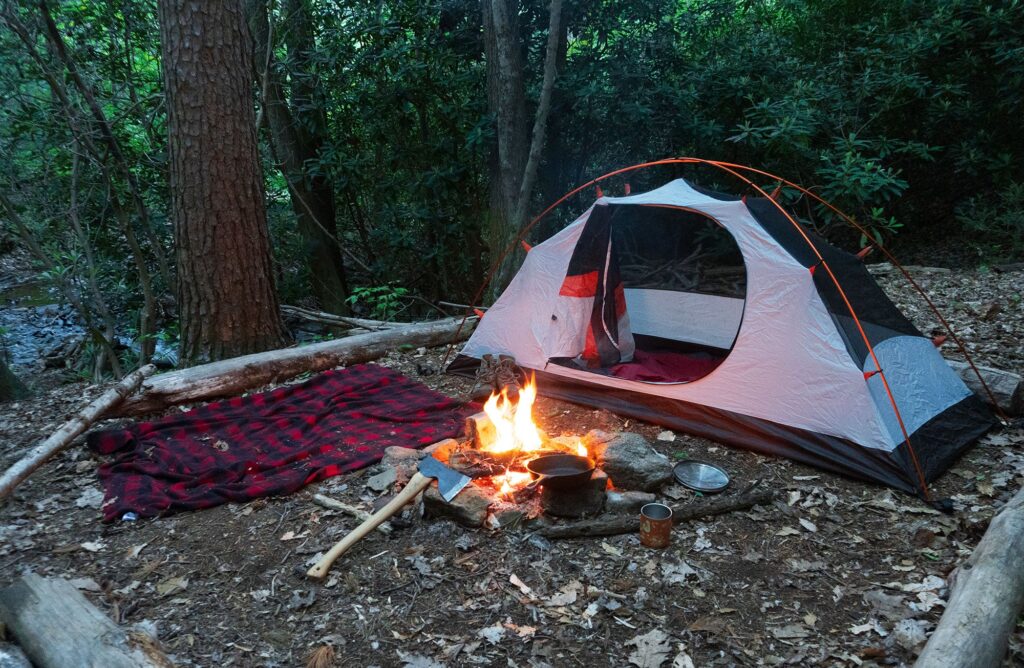
Essential Gear for Beginners:
Alright, my fellow rookie campers, let’s talk gear – the nuts and bolts of ensuring your camping experience is not only enjoyable but downright comfortable. As you embark on this outdoor escapade, having the right equipment can make all the difference. Here’s a rundown of the essential gear every beginner should consider:
Tent Selection and Setup Tips: Your home away from home, the tent, is your sanctuary in the wilderness. Look for one that suits your needs – easy to set up, durable, and appropriate for the season and climate of your chosen camping spot. Practice setting it up at home so you’re not fumbling with poles and stakes in the dark.
Sleeping Bags, Sleeping Pads, and Comfort Essentials: A good night’s sleep is non-negotiable. Invest in a sleeping bag suitable for the temperatures you might encounter. Throw in a sleeping pad for added insulation and comfort. Don’t forget a pillow or improvise with clothes to make those nights under the stars more restful.
Clothing and Footwear Recommendations: Layers, layers, layers! Dressing appropriately for the outdoors is key. Pack moisture-wicking base layers, insulating mid-layers, and waterproof outer layers. A sturdy pair of hiking boots with good ankle support will be your best friend on the trails.
Packing Checklist for a Stress-Free Camping Trip: Ever reached a campsite only to realize you left your flashlight at home? We’ve all been there. Create a checklist covering everything from the basics (food, water, and first aid kit) to the easily overlooked (extra batteries, insect repellent, and a multi-tool). Ticking off items before you leave ensures a smoother adventure.
As you dive into the world of camping gear, remember that quality often pays off in the long run. Invest in reliable equipment, and you’ll find yourself better equipped to face whatever challenges nature throws your way. So, gear up, fellow beginners, and get ready for a camping experience that’s as comfortable as it is thrilling!
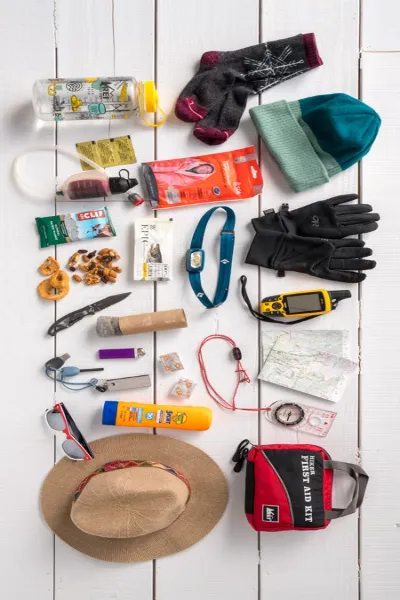
Campfire Safety and Cooking Tips:
Alright, adventurers, let’s gather ’round the campfire – a quintessential part of the camping experience. But before we start roasting marshmallows and swapping stories, let’s ensure our campfire game is on point. Here are some crucial campfire safety tips and cooking hacks to keep the flames burning safely:
Fire Safety Guidelines and Regulations: First things first – check the campsite regulations regarding fires. Some places may have restrictions or bans depending on weather conditions. Once you’re in the clear, pick a suitable spot away from overhanging branches and dry grass. Clear the area, and never leave a fire unattended.
Basic Cooking Equipment for Outdoor Meals: Cooking in the great outdoors doesn’t mean sacrificing tasty meals. Invest in a reliable portable stove or bring a lightweight campfire cooking grate. Don’t forget the essentials: a sturdy pot, a pan, and utensils. Bonus points for a coffee maker to kickstart your mornings!
Simple and Delicious Camping Recipes: Master a few easy recipes that go beyond basic hot dogs on sticks. One-pan meals, foil packet delights, and skewer creations can turn your campsite into a culinary haven. Prep ingredients at home to minimize hassle and make cooking a breeze.
Fire-Starting Techniques: Getting the fire started is an art. Pack waterproof matches or a lighter and bring fire starters or dry tinder. If you’re feeling adventurous, learn the skill of starting a fire with natural materials – it’s a survival skill that adds a primal touch to your outdoor experience.
Now, let’s dive into the cooking tips:
Adjusting Cooking Times: Outdoor cooking can be unpredictable, especially if the wind decides to join the party. Keep an eye on your food, and be prepared to adjust cooking times. A little patience goes a long way in achieving that perfect sizzle.
Safety First, Always: Cooking over an open flame requires extra caution. Use long utensils to avoid burns, and make sure the cooking area is well-lit. Have a bucket of water or a fire extinguisher nearby – better safe than sorry.
Cleanup with Minimal Impact: After a hearty meal, it’s time for cleanup. Follow the Leave No Trace principles by properly extinguishing the fire and packing out all waste. Leave your campsite as pristine as you found it, so others can enjoy the same natural beauty.
Now, armed with these campfire safety tips and cooking tricks, let’s turn those flames into a culinary masterpiece and make memories that’ll linger longer than the scent of wood smoke. Happy cooking, fellow campfire enthusiasts!

Navigating the Outdoors:
Ok, adventurers, let’s tackle the art of navigating the great outdoors. Once you’ve picked the perfect camping spot, it’s time to explore the surrounding wilderness. Whether you’re a seasoned hiker or a first-timer, here are some tips for confidently navigating the trails and embracing the beauty that surrounds you:
Basic Navigation Skills and Tools: Before hitting the trails, familiarize yourself with basic navigation skills. Understand how to read a map and use a compass. Nowadays, there are also handy GPS devices and smartphone apps that can assist you in staying on course. Embrace technology, but don’t forget the fundamental skills that can be a lifesaver when the batteries run out.
Trail Etiquette and Leave No Trace Principles: Respect for nature and fellow campers is paramount. Stick to designated trails to minimize environmental impact, and follow the Leave No Trace principles – leave the outdoors as you found it. Yield to other hikers, and be courteous on the trails. Let’s make sure everyone gets to enjoy the serenity of the wilderness.
Safety Precautions for Wildlife Encounters: Nature is home to a variety of creatures, big and small. Familiarize yourself with the wildlife in the area and take precautions to avoid unexpected encounters. Keep a safe distance, store food securely, and know what to do if you do cross paths with wildlife. Observing from a distance is the key to a harmonious coexistence.
So, lace up those hiking boots, grab your map or GPS device, and venture forth into the beauty that nature has to offer. Navigating the outdoors is not just about reaching your destination; it’s about the journey, the sights, and the sounds along the way. Happy trails, my fellow outdoor enthusiasts!
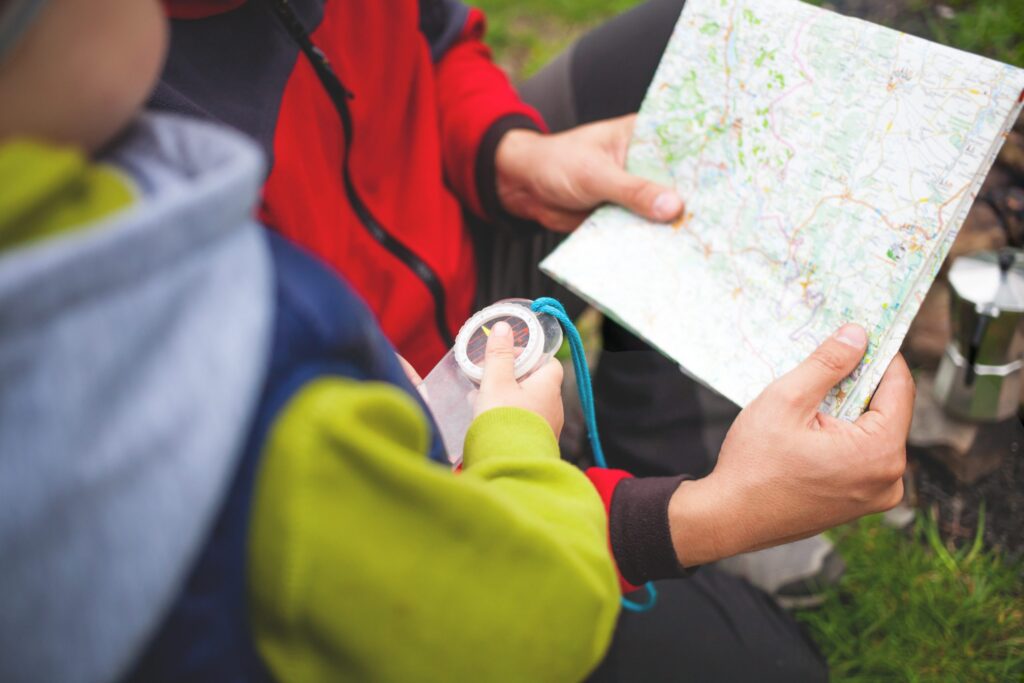
Tips for a Comfortable Camping Experience:
Yes, fellow campers, let’s dive into the realm of creature comforts in the great outdoors. Camping is about embracing nature, but that doesn’t mean sacrificing all the comforts of home. Here are some tips to ensure your camping experience is not just adventurous but downright cozy:
Hygiene Practices and Portable Bathroom Solutions: Staying fresh in the wilderness might seem challenging, but a few simple hygiene practices can make a world of difference. Pack biodegradable soap and a portable toiletry kit. Opt for eco-friendly solutions, and when nature calls, be sure to follow Leave No Trace principles. Trust me; a quick freshen up can lift your spirits after a day on the trails.
Staying Comfortable in Various Weather Conditions: Nature’s mood swings are inevitable, so be prepared for whatever weather comes your way. Pack layers to adjust to temperature changes, bring a waterproof jacket, and invest in a quality, weather-appropriate tent. A cozy camping experience is one where you’re snug and dry, rain or shine.
Making the Most of Your Camping Experience with Fun Activities: Camping isn’t just about setting up camp and calling it a day. Bring along some games, a good book, or a musical instrument. Explore the surroundings, try your hand at fishing, or simply bask in the serenity. The more you engage with your surroundings, the richer your camping experience becomes.
So, when you’re packing for your next camping trip, remember that comfort isn’t just about the gear; it’s about creating a space that feels like your own, even in the heart of nature. With a few thoughtful touches, you can turn your campsite into a home away from home. Here’s to comfortable camping and creating memories that will last a lifetime!
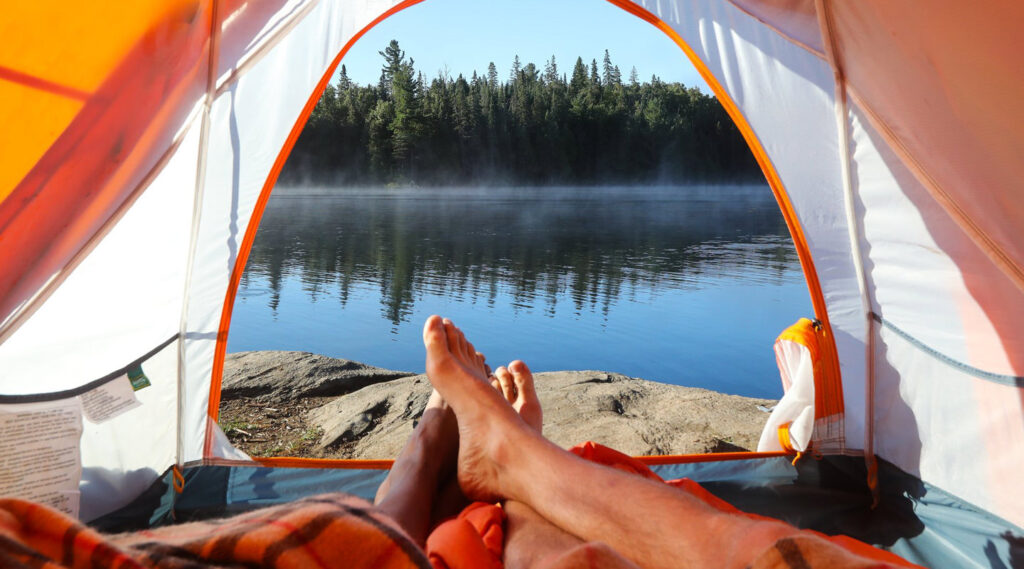
Connecting with Nature:
Hey fellow nature enthusiasts, let’s talk about the soul-nourishing side of camping – connecting with the great outdoors on a deeper level. Beyond the gear and the trails, there’s a profound experience waiting for you. Here’s how to truly immerse yourself and forge a meaningful connection with the natural world:
Benefits of Camping for Mental and Physical Well-being: Camping isn’t just a break from the routine; it’s a rejuvenating journey for your mind and body. The crisp air, the rustling leaves, and the absence of city noise – it all contributes to reduced stress levels and improved mental clarity. Embrace the opportunity to unplug and let nature work its wonders on your well-being.
Mindfulness Practices and Enjoying the Surroundings: As you wander through the woods or sit by the campfire, take a moment to be present. Engage your senses – feel the texture of the earth beneath you, listen to the birdsong, and breathe in the scent of pine. Mindfulness in nature amplifies the experience, turning a simple walk into a profound connection with the world around you.
Balancing Technology Use for a More Immersive Experience: While technology has its place, consider a digital detox during your camping trip. Limit screen time, turn off notifications, and allow yourself to be fully present in nature. A break from constant connectivity can foster a deeper appreciation for the beauty that surrounds you.
So, as you embark on your camping adventure, open your senses to the natural symphony around you. Whether it’s a quiet moment of reflection, a sunset hike, or simply watching the stars, these connections with nature will leave an indelible mark on your soul. Happy camping, and may your journey be filled with moments of awe and serenity!
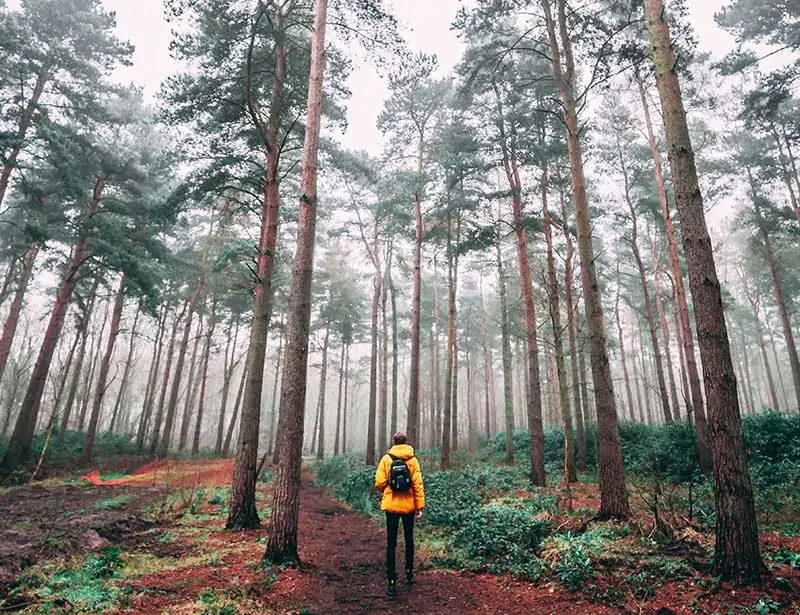
Troubleshooting and Emergency Preparedness:
Adventurers, let’s face it – sometimes things don’t go as smoothly as planned in the great outdoors. That’s why it’s crucial to be prepared for the unexpected. From minor hiccups to potential emergencies, here are some tips to troubleshoot and stay safe during your camping escapades:
Common Challenges for Beginners and How to Overcome Them: First things first, let’s address those common hurdles that might trip up beginners. Whether it’s struggling with tent setup, dealing with unexpected weather changes, or even just getting used to cooking outdoors – these challenges are part of the learning curve. Don’t be discouraged; embrace them as opportunities to enhance your camping skills.
Emergency Preparedness Checklist: Now, let’s talk about the serious stuff. Every camper should have an emergency preparedness checklist. This includes essentials like a first aid kit, emergency contacts, a map of the area, and a multi-tool. Familiarize yourself with basic first aid procedures – you never know when that knowledge might come in handy.
Knowing When to Seek Professional Help: There’s no shame in admitting when you’re in over your head. If a situation escalates beyond your control or comfort level, don’t hesitate to seek professional help. Have a plan for communication – carry a fully charged cell phone, a portable charger, and know the nearest points of contact for emergency services.
So, fellow campers, don’t let the possibility of challenges or emergencies dampen your enthusiasm. Instead, let it fuel your commitment to being a responsible and well-prepared adventurer. With the right mindset and a little know-how, you’ll be ready to troubleshoot anything nature throws your way. Stay safe out there!
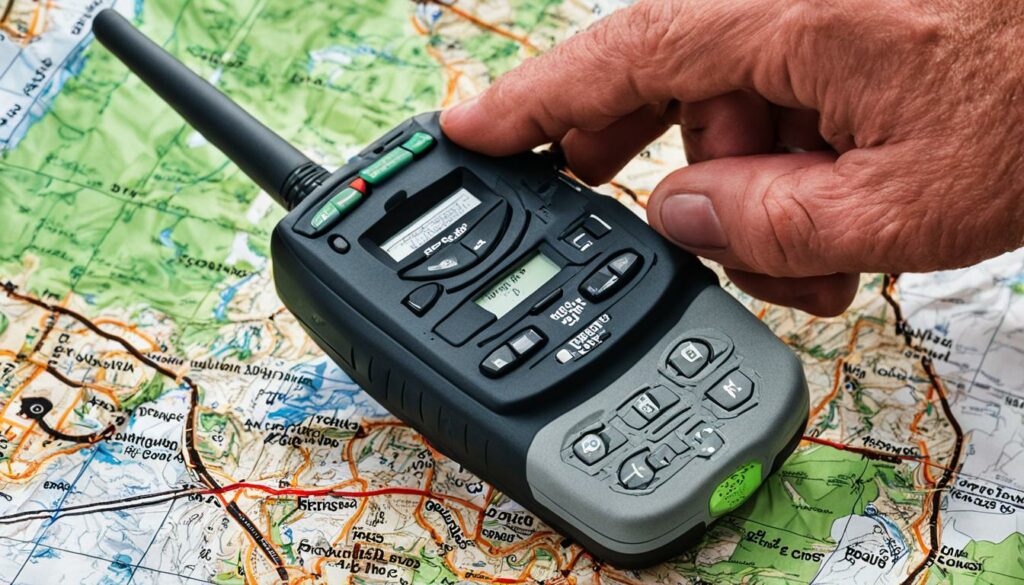
FAQs – Camping in USA Tips for Beginners
Q1: What’s the first thing I should consider when planning my first camping trip? A: Choosing the right location is key. Research beginner-friendly campsites, considering climate, terrain, and regulations.
Q2: What should I look for when selecting a tent? A: Prioritize ease of setup, durability, and suitability for the season and climate. Practice setting it up at home to avoid surprises in the wilderness.
Q3: How can I stay comfortable in different weather conditions? A: Pack layers, a waterproof jacket, and a weather-appropriate tent. Being prepared for temperature changes ensures a cozy camping experience.
Q4: What are some essential items to include in my packing checklist? A: Don’t forget the basics like food, water, and a first aid kit. Also, pack items often overlooked, such as extra batteries, insect repellent, and a multi-tool.
Q5: How can I connect with nature on a deeper level during my camping trip? A: Practice mindfulness, engage your senses, and consider a digital detox. Take moments to appreciate the natural beauty around you for a more immersive experience.
Q6: What should I do in case of a wildlife encounter? A: Keep a safe distance, store food securely, and be aware of local wildlife. Knowing the basics of wildlife safety minimizes risks.
Q7: How can I troubleshoot common camping challenges as a beginner? A: Embrace challenges as learning opportunities. Seek advice from experienced campers, practice essential skills, and be open to learning from your experiences.
Q8: What’s the importance of emergency preparedness in camping? A: Emergency preparedness is crucial for your safety. Always have a first aid kit, emergency contacts, and a map. Know when to seek professional help and carry communication devices.
Q9: Can I use my smartphone for navigation in the outdoors? A: Yes, you can use your smartphone, but always have a backup like a physical map or a GPS device. Be mindful of battery usage and consider offline maps.
Q10: How do I balance technology use during camping for a more immersive experience? A: Limit screen time, turn off notifications, and focus on being present in nature. A digital detox enhances your connection with the outdoors.
Remember, these FAQs provide a starting point for your camping journey, but always adapt your plans based on the specific details of your trip and the unique conditions of the campsite.